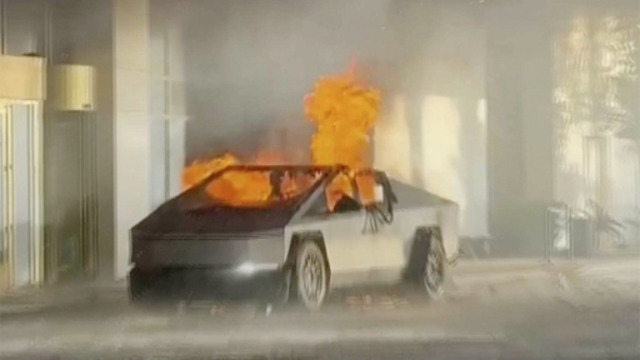
A Tesla Cybertruck exploded outside the Trump Hotel in Las Vegas early on January 1, 2025, as shown in an image provided by Alcides Antunes. AP Photo
A decorated Army soldier, Matthew Livelsberger, tragically ended his life in a dramatic explosion outside the Trump International Hotel in Las Vegas on New Year’s Day. The 37-year-old Green Beret from Colorado Springs left behind a series of notes explaining that his death, caused by a self-inflicted gunshot wound, was not a terrorist act but a “wake-up call” for the nation.
Livelsberger, who had served in the military since 2006 and deployed twice to Afghanistan, made a poignant statement in his notes: he wished to “cleanse” his mind of the brothers he had lost and the burden of the lives he had taken during his service. His struggle with the mental scars of war, including Post-Traumatic Stress Disorder (PTSD), was evident as he expressed his pain in his writings.
According to investigators, the explosion was triggered by a combination of fireworks and camp fuel packed inside Livelsberger's Tesla Cybertruck. The blast caused minor injuries to seven individuals but left the Trump hotel largely undamaged. Authorities believe Livelsberger acted alone and clarified that there was no direct connection to the hotel’s association with President-elect Donald Trump. In fact, Livelsberger expressed support for Trump and Tesla CEO Elon Musk in his notes.
The explosion, although highly public and dramatic, was deemed a tragic incident related to Livelsberger’s battle with PTSD. His letters covered a variety of topics, from political grievances to concerns about societal collapse. Livelsberger went so far as to state that America was “terminally ill and headed toward collapse.” The soldier’s actions seemed to be his final attempt to make a statement about what he believed were the country’s deep-seated problems.
Investigators are still piecing together details from Livelsberger’s path to Las Vegas, which included a journey through Colorado, New Mexico, Arizona, and into Nevada. Tesla engineers helped authorities extract vital data from the vehicle, including GPS history, photographs, and web activity that could provide more insight into his state of mind during the lead-up to the explosion.
While the explosion itself raised many questions, it was revealed that Livelsberger had expressed his struggles with the pain and exhaustion he felt due to traumatic brain injury to his former girlfriend, Alicia Arritt. She described how he often struggled with memories from his deployments, suffering from insomnia and physical pain.
Livelsberger’s remarkable military career included five Bronze Stars, one with a valor device, and an Army Commendation Medal with valor. He had also served in various international locations, including Ukraine, Tajikistan, and the Congo. Despite his honors, Livelsberger was reportedly in significant emotional distress in the months leading up to the incident.
Authorities also conducted a search of Livelsberger’s townhouse in Colorado Springs as part of the investigation, where neighbors recalled him as a “normal guy.” His tragic end has raised concerns about the psychological toll on military personnel returning from combat zones.
Livelsberger’s death occurred just hours before another violent incident in New Orleans, where a man rammed a truck into a crowd, resulting in at least 14 deaths. While both incidents were isolated, they highlight the ongoing challenges of mental health in a society marked by violence and instability.















